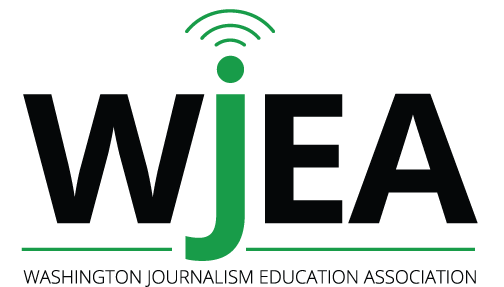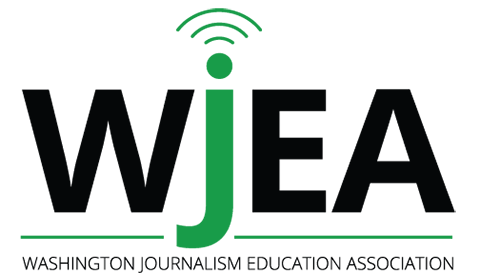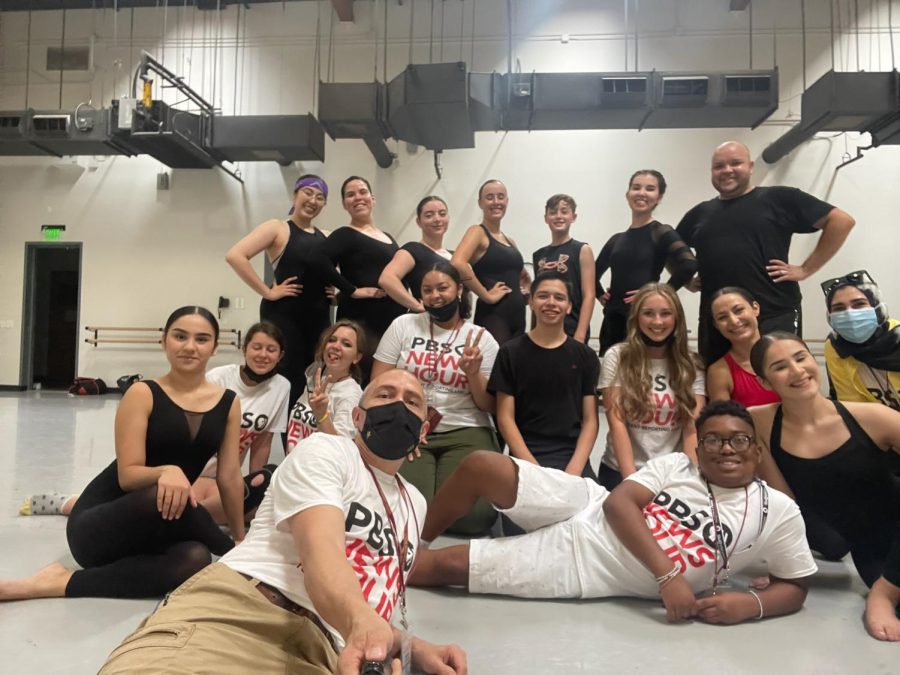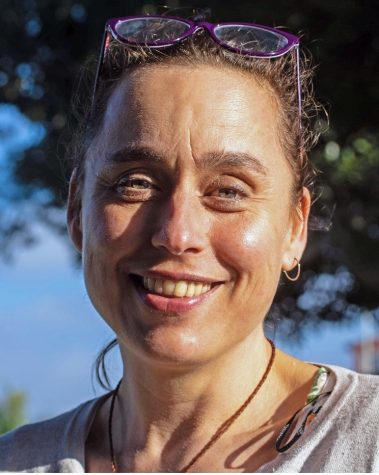A Lifetime of Elevating Student Voice
Christopher Schwalm at the ASU Walter Cronkite School of Journalism with a student group after filming B-Roll at the Arizona Ballet studio for their story which aired on NewsHour.
When PBS NewsHour Reporting Lab’s youth media producer, Chris Schwalm, was hired to teach English, he inherited the journalism and yearbook programs by default. It was 1997. His only media experience was as a student teacher with his mentor who ran the media program. left and he “got the gig.”
It was a tough year.
“Just basically the first year Terrors,” explained Schwalm on a January afternoon over zoom. Schwalm is this year’s keynote speaker for the WJEA State conference and Write-off, which will be held March 4 at Mountlake Terrace High School.
He had to teach dark room photography – “had never done it before”-a censorship issue came up with administration, and his editor-in-chief resigned. He was also tasked with starting a broadcast program. Instead of throwing his hands up, the terrible first year lit a fire.
“And so that has driven me. Every year it was, ‘how can I do this better’ and then ‘how can I provide better opportunities for my students?’”
He has devoted his entire career to making sure he never finds himself in that position again, and that students and advisors have the support that they need to do the work of student journalism.
He started with a series of news writing and public relations Master classes at Temple University and worked as correspondent nights and weekends to up his game.
Schwalm, who is fluent in Spanish after a two-year stint in Caracas, Venezuela working with business professionals to improve their English and reporting on the side, has also worked as a yearbook rep and a newspaper reporter. He has spent over 23 years in the classroom advising his own media programs, continually returning to school to gain more tools for the work.
He went on to earn his masters in information technology in 2009, and in 2020 completed the Social Media Marketing component of the Communications Technology graduate program at Point Park University.
“I went back and did social media marketing because I realized that I had to ask, how can I do this better? And how can I prepare students for what’s going on today? And social media marketing marketing is an absolute must in my media classes. It’s not for me, but for the students.”
When he was hired to work with the PBS NewsHour Reporting Lab, he found the perfect home to carry out the mission that has driven him since that first year.
Schwalm is one of five youth media producers who works to connect students with Broadcasting mentors with the reporting lab. The reporting lab program offers curriculum for creating digital media, and developing the communications skills and critical thinking to make strong media content, according to the website.
“The goal is to provide transformative educational experiences for young journalists and that’s expanding from, it used to be exclusively video, that is expanding to different genres,” says Schwalm, who works with students to develop ideas, and hopefully air them on the program. PBS also hosts a student-led mental health podcast for teens by teens and accepts pitches from students around the country.
“The goal is that they gain confidence, they gain agency and they also connect to the communities in ways that are meaningful.”
Getting teen voices heard on a national level is part of that.
“The youth voice has been missing in mainstream media for a long time and this is a unique opportunity for young people to cover their communities locally in a way that has been lost because the corporate mergers have gobbled up a lot of local stations,” said Schwalm.
Schwalm and the Student Reporting Lab program, provide support both on the ground and remotely to students and advisors in getting those stories produced at a professional level.
“Or, if there is a story that [has] a particular interest maybe for NewsHour, then it’s possible for me to go out and work with the school on the ground to develop it beforehand.”
One such story aired on the PBS NewsHour last winter.
When student journalists at the Daniel Pearl Magnet High School for Journalism and Communication wrote a story on the library closing after the librarian refused the Covid vaccine, the administration of the school asked the student journalists to remove the librarian’s name from the story. The newspaper staff, backed by their adviser, refused. The story, reported by a student journalist, recounts how the advisor was suspended.
The students turned to Mike Hiestand at the Student Press Law Center SPLC and were told they were well within their rights to publish the name of the librarian. The PBS broadcast highlighted New Voices law, passed in California, which protects press freedom of student journalists and their advisors.
“The irony is just incredible,” says Schwalm of the school, named after Daniel Pearl, kidnapped and killed while living and reporting in Pakistan by terror groups. “If it can happen there, it can happen anywhere, and that was the reason we thought it was really important to tell the story.”
Schwalm compares his own first year as an adviser when there was no New Voices law, to those who have the law behind them when it comes to standing up for student press rights. The administration backed down when the case began to receive national attention.
“And thank goodness for the student press Law Center to help provide that support. I had no protection, I did not have tenure,” said Schwalm of the days before the New Voices law. “I was not prepared to stand up for the young journalists in my program under administrative pressure.”
As an educator, and now a producer for the show, Schwalm says he has found his dream job supporting young journalists to tell their stories and advisors who may not have all the tools they need. When it comes to working with teachers, he knows the pressures they work under.
“Always looking for the best opportunities for my students throughout the years as an educator, Student NewsHour Reporting Lab was one the best, and it was free. It came with a person, the students were producing content in my classroom, as well as a platform to elevate their voices, And it still does that, and I just have to pinch myself sometimes.”




